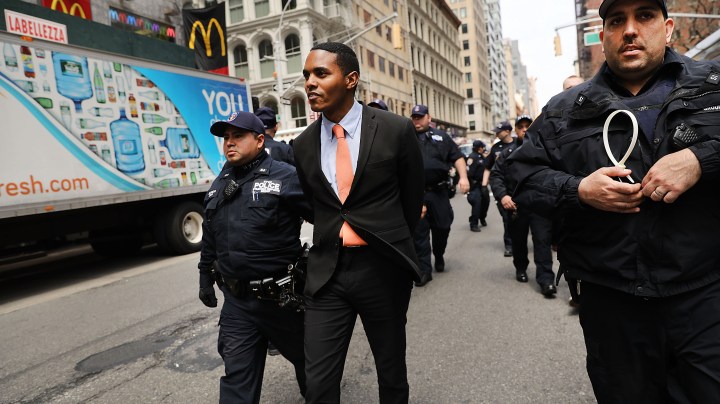Ritchie Torres Could Be the First Out Afro-Latino in Either Chamber of Congress

New York City Council Member Ritchie Torres is arrested with other activists at a rally demanding that the Trump administration abandon proposals to cut the Housing and Urban Development's (HUD) budget on April 20, 2017 in New York City. Photo by Spencer Platt/Getty Images
New Yorkers cast their ballots in the primary this week amid the pandemic, facing challenges such as long lines, crowds, and broken voting machines. Outlets also reported a myriad of issues with absentee ballots, which still need to be counted and will likely delay the results of the election until July. Still, projections have already shown that Alexandria Ocasio-Cortez easily swept her race, while in the 15th Congressional District, councilman Ritchie Torres is taking the lead over Rubén Díaz Sr., a pentecostal minister who despite his Democratic affiliation has a conservative history that includes anti-gay statements and anti-abortion beliefs.
Late last night, the New York Post shared returns from 61% of precincts that had come back and indicated Torres was leading by 30% of votes. Torres, who grew up in the Bronx with Puerto Rican and Black parents, could be among the two first out gay Black men in either chamber of Congress. (Mondaire Jones, also a gay Black man, is pulling ahead in a neighboring district and would make history alongside Torres if they both win their races.)
Despite his lead, Torres suggested in interviews yesterday that he doesn’t want to celebrate prematurely and that it’s important to him to have every vote tallied up.

“I’m not prepared to declare victory until every vote is counted,” Torres said in a NY1 interview. “But, even if I win the election, it’s governing that matters—it’s delivering results for the everyday people of the South Bronx.”
He continued and got emotional, saying, “It would be the honor of my life to represent this borough, it’s my home. I would not be here today if it were not for my mother. The South Bronx is full of mothers like mine who have suffered and struggled and sacrificed so that her baby boy could have a better life than she did.”